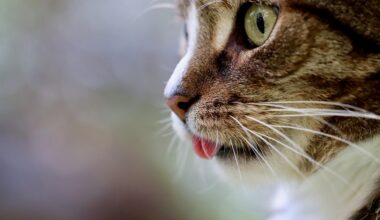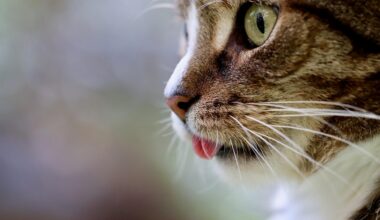The Role of Cats in Alleviating Symptoms of Seasonal Affective Disorder
Seasonal Affective Disorder (SAD) is a common form of depression that reoccurs seasonally, often during the fall and winter months. Many individuals seeking solutions overlook the benefits that pets, particularly cats, can provide in alleviating these symptoms. Cats offer a unique companionship that can help combat feelings of sadness, anxiety, and lethargy caused by the lack of sunlight. The presence of a cat can create a more engaging home environment, providing emotional support during dark days. Research has shown that petting a cat can significantly reduce stress levels by releasing oxytocin, a hormone linked to feelings of bonding and relaxation. This interaction can improve mood and promote a sense of well-being. Moreover, the purring of cats offers a soothing effect that may help calm those experiencing sadness or depressive moods. Sitting with a cat while listening to its tranquil purr can create a peaceful atmosphere, leading to improved mental health. Thus, incorporating a cat into the home can be an enriching solution for those struggling with SAD.
Cats not only provide emotional support but also encourage physical activity, which is crucial for maintaining mental health. Engaging in playtime with a cat can promote exercise, even when the weather outside is less than inviting. Activities such as throwing a toy or using a laser pointer can stimulate both the owner and the cat. These moments of playful interaction help release endorphins, the body’s natural mood lifters, which can alleviate symptoms of depression related to SAD. Furthermore, taking care of a cat creates a routine that can be incredibly beneficial for individuals affected by SAD. The responsibility of feeding, grooming, and playing with a cat can foster a sense of purpose and routine that is often lost during depressive episodes. Establishing this daily structure provides both mental and emotional stability. Cats, known for their independent nature, require considerably less upkeep than other pets, allowing individuals dealing with SAD to engage without overwhelming commitment. Establishing such a routine helps ground individuals in their day-to-day lives and provides moments to look forward to amid the dreary days.
Moreover, cats can serve as a source of comfort during the long and often isolating winter months. Their calming presence can make a home feel less lonely. For many people suffering from Seasonal Affective Disorder, isolation can exacerbate feelings of sadness. Cats provide companionship that can reduce feelings of loneliness and foster social engagement. Many owners find themselves speaking to their cats, which can be therapeutic in itself. This interaction fulfills a social need and combats the isolation that SAD can bring. Additionally, the act of caring for a cat can enhance personal well-being, creating a bond that brings joy and comfort. Spending time with a cat can also facilitate enjoyable activities, from simply watching them play to curling up together with a book, which can boost overall morale during tough times. Adopting a cat can therefore enhance mental health by creating daily opportunities for connection and interaction, countering the debilitating effects of loneliness experienced by many individuals. This unique bond showcases the significant role cats play in improving human mental health.
Therapeutic Benefits of Cats
In recent years, the therapeutic benefits of companionship animals, particularly cats, have garnered attention from mental health professionals. Studies indicate that cats can lower cortisol levels, the stress hormone, and elevate mood through positive interactions. This is crucial for individuals struggling with SAD, where external cues like daylight can be lacking, leading to emotional disturbances. Cats create a comforting presence that can mitigate these feelings through simple contact. The act of petting a cat can elicit joy and promote relaxation. Moreover, the responsibility associated with pet ownership can foster a sense of control and accomplishment. Additionally, cat owners often report lower levels of anxiety when spending time with their pets. Having a cat at home creates an ambiance of affection and warmth, contributing to a healthier mental state. As owners nurture their pets, they cultivate a relationship based on mutual care and affection. This nurturing aspect is integral to battling the negative ramifications of SAD, as emotional support is vital during challenging seasons, providing owners with companionship and a sense of security.
Another essential aspect of cat companionship is its potential to foster resilience in individuals suffering from Seasonal Affective Disorder. Cats, with their playful antics, remind their owners to embrace joy in small moments. This perspective shift can be particularly vital for those feeling hopeless or overwhelmed during darker days. Cats can motivate their owners to focus on positive aspects of life, encouraging a brighter outlook even in challenging circumstances. Engaging with a cat’s playful personality can elevate mood and invite laughter, which is important for combating feelings of despair. The bond formed during shared jubilant moments can serve as a foundation for improved mental health. Cat companionship not only offers immediate emotional support but can also instill coping mechanisms that enhance resilience. By providing an avenue for joy and distraction from negative thoughts, cats can help individuals manage their symptoms and develop healthier responses to feelings associated with SAD. Therefore, cats serve as emotional anchors that can ground their owners when faced with life’s ups and downs.
Long-term Considerations of Cat Ownership
When considering the long-term mental health benefits of cat companionship for those with Seasonal Affective Disorder, continuous commitment must be highlighted. Owning a cat is a long-term responsibility that encompasses emotional, financial, and personal dedication. Yet, the rewards often outweigh the challenges. Cats provide unconditional love and companionship, offering consistency amid seasonal fluctuations in mood. The commitment to care for a cat can create a profound bond, resulting in lasting emotional benefits. Regular interactions with a cat can foster a deeper sense of connection that enhances a person’s quality of life. Moreover, as individuals navigate through various seasons, having a cat can serve as a glorious reminder of warmth and companionship. Building this steady companionship can enhance resilience against the negative emotions stemming from SAD. The memories created through shared experiences will remain invaluable. Thus, owning a cat emerges not only as a remedy to combat symptoms of depression but as an enduring relationship that fosters emotional growth, resilience, and overall mental well-being.
In conclusion, the mental health benefits of cat companionship in alleviating Seasonal Affective Disorder are extensive and profound. Cats provide emotional support that is comforting and encouraging during difficult seasonal shifts. Their playful nature, warm presence, and affectionate disposition contribute significantly to improving the mood of individuals battling SAD. By incorporating a cat into one’s life, people experiencing depressive episodes find companionship that lifts their spirits and combats feelings of isolation. The connection forged between cats and their owners enhances daily living, providing motivation and joy essential for mental well-being. While cat ownership involves commitment and effort, the emotional rewards received in return create a balanced and supportive environment for healing. Thus, for those dealing with SAD or similar conditions, the solution may lie in the paws of a furry friend, demonstrating the unique role cats play in enhancing mental health. By embracing this companionship, individuals not only improve their coping mechanisms but experience brighter, more joyful moments together, illuminating the way through seasonal darkness.
Final Thoughts on Cat Companionship
In summary, considering the impact of companionship animals like cats is critical for mental health, especially when addressing seasonal affective disorders. The consistent affection and engagement that comes with cat ownership can elevate an individual’s outlook, making them feel less isolated. However, it is important to understand that pet ownership is a significant commitment that should be approached responsibly. For those who feel bogged down by SAD, seeking out a feline companion could provide the emotional balm needed to alleviate their symptoms. Therefore, taking the leap to adopt a cat could be a pivotal step towards better mental health and emotional fulfillment.


